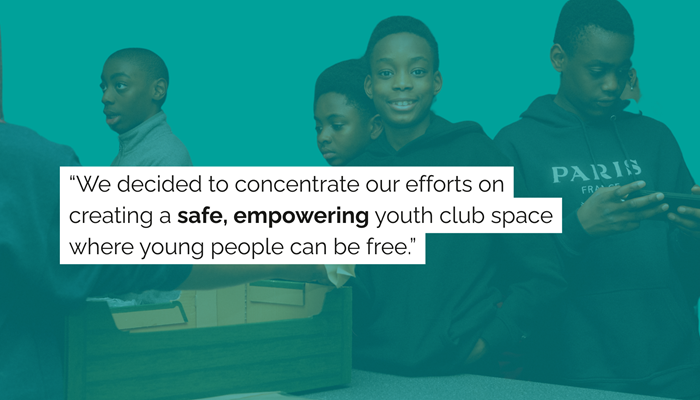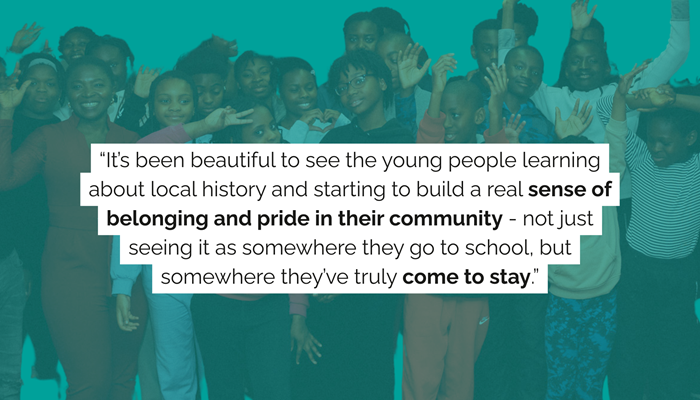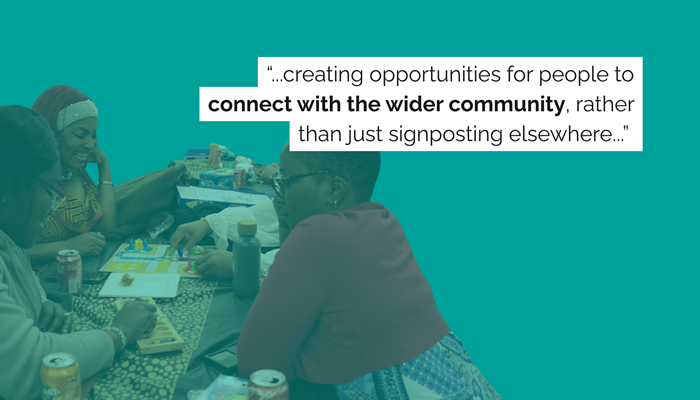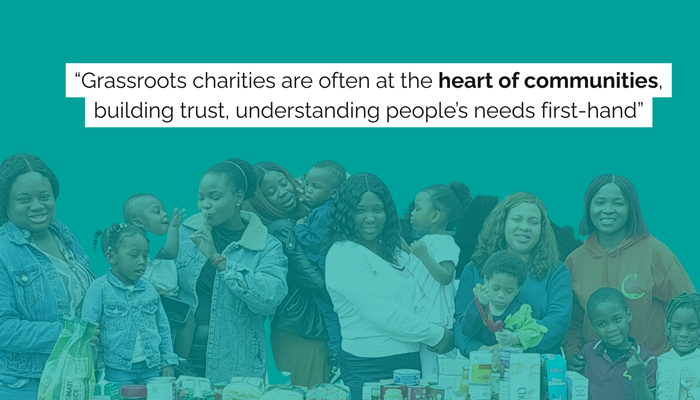
"For many, we’re their first point of contact, and it’s crucial that they find not just advice, but real community and understanding when they walk through our doors." Jane Akadiri, Founder
Touch of Love is focused on supporting minority ethnic and New Scots families to settle and thrive in Aberdeen.
We recognise that integration is a journey, with unique challenges and opportunities. Our aim is to create a welcoming, empowering, and culturally-sensitive environment where families can build strength and a real sense of belonging.
Where are you focusing your support right now?
Our support is focused on families and young people from minority ethnic backgrounds who do not have access to public funds. Although we initially began as a foodbank for the whole community, we realised that food insecurity was only part of the issue. We cannot be everything to everyone, so to maximise our impact, we refined our focus based on feedback and insights from the local community.
In the early days of Touch of Love, we saw firsthand that young people from these communities face unique pressures - managing cultural differences, trying to "get it right" across different family and societal expectations, and often struggling for acceptance. That’s why we decided to concentrate our efforts on creating a safe, empowering youth club space where young people and families can be free - where they can share what they are going through and find tailored support that they may not access elsewhere.
We also recently launched Mum and Baby group for parents of toddlers aged 0–3 years. These parents often experience isolation and have limited access to public support so the group provides vital peer connections, information, and emotional support.
Families of people who access our services are also linked through a community WhatsApp group, allowing us to offer holistic help and quickly connect them to resources, events, and learning opportunities.

What elements of your service or activities have made the biggest difference for those you work with?
Creating opportunities for people to connect with the wider community, rather than just signposting them elsewhere.
We know that new Scots often stick together - and you can’t blame them, because arriving somewhere new can feel like being a fish out of water. To help build trust and confidence, we try to bring services directly into our premises. We’ve hosted talks and advice sessions from groups like Barclays Bank, the Aberdeen Health and Social Care Partnership, and local schools, so people can get the right information in a familiar, welcoming space.
We also work hard to encourage people to engage with life in Aberdeen. For example, we build events around activities like the Kiltwalk, Celebrate Aberdeen, and Aberdeen Mela, helping our community step out of small cliques and feel part of the city. It’s about giving people the confidence to integrate – and that may start with little conversations about the weather, or the food, or the flowers etc…
Our youth work is another strong example. Through a project in Torry, young people are interviewing older residents about their memories of the area. It’s been beautiful to see the young people learning about local history and starting to build a real sense of belonging and pride in their community - not just seeing it as somewhere they go to school, but somewhere they’ve truly come to stay.

How do poverty and trauma figure in your work?
Poverty and trauma are at the heart of everything we do. The families we work with are often dealing with the full force of the cost-of-living crisis, visa restrictions that limit their ability to work, zero-hour contracts, and the struggle to adjust to a completely new culture, language, and environment.
Many are juggling immigration rules while trying to keep their families afloat financially and emotionally. This pressure pulls at every part of family life. We feel that a problem half shared is half solved - even if we can’t always fix the issue immediately, we can listen, offer support, and help them navigate to the right services.
Often, poverty and trauma don’t show themselves in obvious ways - it might be a child withdrawing, a parent acting distant, or someone simply looking overwhelmed. By building trust through informal chats, peer support groups, and a welcoming environment, we’re able to pick up on these signs and offer help when it’s needed most.
For many of our people, we’re their first point of contact, and it’s crucial that they find not just advice, but real community and understanding when they walk through our doors.

What are the biggest challenges/barriers facing you as an org and/or those you work with/support?
One of our biggest challenges as a young organisation was building trust and navigating the system. At the beginning, it was really hard to make headway - there were a lot of screening processes, endless forms, and a need to constantly prove ourselves before we could get any real support for the families we were working with. Over time, as we've built relationships and become more visible, that's improved, but it was a real barrier early on.
Funding is another ongoing difficulty. Small grassroots organisations like ours often struggle to get the recognition and support we need. Funders tend to focus on large, well-established organisations, but we’re close to the people and we understand their struggles and the practical solutions they need.
Larger organisations might have the resources to focus on policy change or large-scale programmes, but they often rely on grassroots groups like ours to actually reach people on the ground. In fact, we’re regularly approached by bigger organisations who have the funding but not the direct community links - and we’re happy to collaborate. It shows the real strength of grassroots work.

How can funders support your work?
Again, recognise the value and impact of grassroots organisations like ours. Small charities are often at the heart of communities, building trust, understanding people’s needs first-hand, and providing immediate, practical support. Even though we’re small, we create big impact. We believe funders should put more trust in small organisations, even if we don’t always have the digital tools or capacity to ‘prove’ our impact in formal ways. What matters is that we’re close to the people and close to the solutions.
Another important change would be offering more flexible funding. Too often funding is tied to very specific projects, which creates excessive administrative pressure and makes it harder for small organisations to respond to what’s actually needed. More unrestricted funding would give us the breathing space to be more agile, responsive, and sustainable.
What changes would you like to see in your area of focus during the next decade?
A much stronger focus on early intervention - catching issues before they escalate, especially with young people. If we can engage them early enough, we can help prevent pathways into crime and other difficulties.
We also want to see a shift from food banks towards true food justice. People should be able to access the benefits and support they are entitled to without facing endless system bottlenecks. Right now, charities are too often left to ‘mop up’ after public services. While we are committed to doing good work, we shouldn’t be filling gaps that public services should be responsible for.
When it comes to funding, we hope to see more flexible, inclusive approaches. Project-only funding can create huge administrative burdens, especially for small organisations, making it harder to be responsive to the real needs we’re seeing on the ground.
Finally, we want to see serious action on structural inequalities - across healthcare, employment, housing, and beyond. Structural racism and systemic bias do exist, and it’s vital that public services acknowledge these realities and work actively to dismantle them.
Touch of Love
Based in Torry, Touch of Love is a community-driven charity dedicated to supporting minority ethnic communities and New Scots in Aberdeen. Key activities include a food bank, youth club and cultural integration activities and sessions, all of which are designed to create opportunities for meaningful growth and integration.
Since 2020 the charity has supported over 36,000 individuals and has distributed approx 20,000 food parcels to people experiencing food insecurity.
In 2024, Touch of Love received an unrestricted £39,000 Small Grant from The Robertson Trust towards its work.
Find out more about the organisation's work here.
